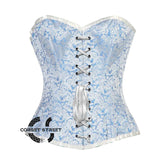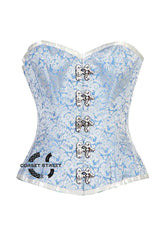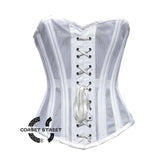Tightening Up the History: Modern Corsets vs. Traditional Corsets
The corset, a garment synonymous with shaping silhouettes, has a long and fascinating history. From its origins as a practical undergarment to its modern-day use as a fashion statement and posture aid, the corset has undergone significant transformations. Let's delve into the key differences between modern and traditional corsets, exploring their materials, uses, and evolution in the world of fashion.
The Backbone of It All: Boning
The most defining difference lies in the materials used for structure. Traditional corsets relied on baleen, a stiff yet flexible material derived from the mouths of baleen whales. While effective, baleen had its drawbacks. It was expensive, could break if laced too tightly, and raised ethical concerns due to whaling practices. The 20th century ushered in a revolution with the introduction of steel boning. This stronger, more affordable option offered greater shaping potential and durability, becoming the mainstay of modern corsets.
Materials Make the Difference
Beyond boning, the fabric choices for corsets have also evolved. Traditional corsets were primarily crafted from sturdy natural fabrics like linen and cotton, sometimes stiffened with starch for added structure. More opulent garments might utilize silk or satin. Modern corsets offer a wider variety. Cotton remains popular for its breathability, while synthetic fabrics like nylon and polyester provide shape retention and affordability. Modern corsets may also incorporate mesh panels for ventilation and comfort, a feature absent in their historical counterparts.
From Necessity to Choice
The purpose of corsets has also shifted dramatically. Traditional corsets were primarily functional undergarments. They served to create a fashionable silhouette, but more importantly, they offered back support and helped distribute weight evenly. In some cultures, corsets even played a role in signifying social status. Modern corsets, on the other hand, cater to a wider range of uses. They are still employed for waist training and achieving an hourglass figure, but they are also embraced as fashion statements. Corsets can be worn as outerwear for a dramatic and burlesque-inspired look, or incorporated subtly beneath clothing to create a smooth silhouette. Additionally, some modern corsets are designed specifically for posture improvement and back pain relief.
Comfort and Safety
The comfort level of corsets has also seen significant improvement. Traditional corsets, with their rigid structure and limited adjustability, could be restrictive and even uncomfortable. Modern corsets often incorporate panels and adjustable lacing for a more customized fit. Additionally, advancements in boning technology have led to the creation of flat steel bones, which are more flexible and conform better to the body's curves. While proper corset etiquette, like gradual tightening and not over-lacing, remains important, modern corsets generally offer a more comfortable wearing experience.
A Fashionable Evolution
The corset's journey through fashion is a testament to its adaptability. In the Victorian era, the corset was a symbol of femininity and social status. The emphasis was on achieving an extremely cinched waist, often leading to health concerns. The 20th century saw a decline in corset use, with looser silhouettes taking center stage. However, the corset has enjoyed several revivals throughout the past century, each time reinvented to suit the current fashion trends. Today, corsets are embraced for their diverse applications, from everyday wear to high fashion and cosplay.
The Future of Corsets
Corsets continue to evolve, with innovations in materials and design shaping their future. We might see the use of eco-friendly and sustainable materials, alongside advancements in breathable and moisture-wicking fabrics for improved comfort. The medical field might explore the use of corsets for improved posture correction and pain management. As for fashion, the corset's ability to transform the body and create dramatic silhouettes ensures its place in the ever-changing world of style.
Whether you view them as a historical curiosity or a contemporary fashion statement, modern corsets stand as a testament to the evolution of undergarments and their lasting impact on shaping not just bodies, but also cultural perceptions.








